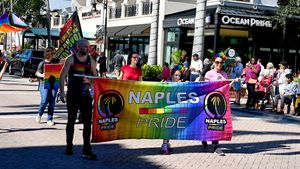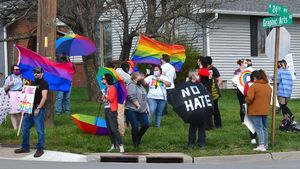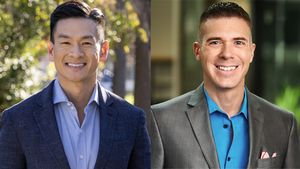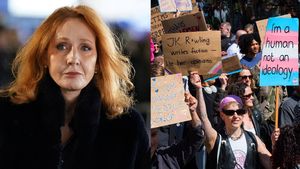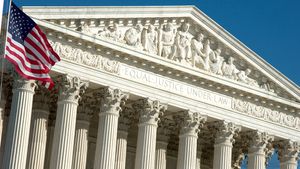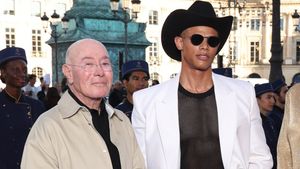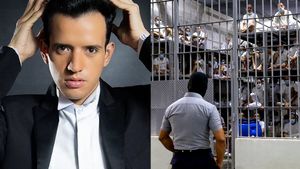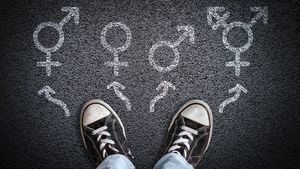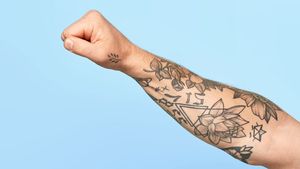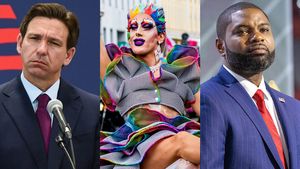Tuesday's landmark speech from Secretary of State Hillary Clinton outlined the United States' stance on an "invisible minority" in many countries, as she put it — LGBT and gender-variant people. The full speech is available here, but if you're in a hurry, here are eight key points made during her address on global gay rights to United Nations member countries.
1. On the Universal Declaration of Human Rights
It proclaims a simple, powerful idea: All human beings are born free and equal in dignity and rights. And with the declaration, it was made clear that rights are not conferred by government; they are the birthright of all people. It does not matter what country we live in, who our leaders are, or even who we are. Because we are human, we therefore have rights. And because we have rights, governments are bound to protect them.
2. On the Status of LGBT Rights in the U.S.
I speak about this subject knowing that my own country's record on human rights for gay people is far from perfect. Until 2003, it was still a crime in parts of our country. Many LGBT Americans have endured violence and harassment in their own lives, and for some, including many young people, bullying and exclusion are daily experiences. So we, like all nations, have more work to do to protect human rights at home.
3. Why Do Countries Need to Distinguish Gay Rights?
Some have suggested that gay rights and human rights are separate and distinct; but, in fact, they are one and the same. Now, of course, 60 years ago, the governments that drafted and passed the Universal Declaration of Human Rights were not thinking about how it applied to the LGBT community. They also weren’t thinking about how it applied to indigenous people or children or people with disabilities or other marginalized groups. Yet in the past 60 years, we have come to recognize that members of these groups are entitled to the full measure of dignity and rights, because, like all people, they share a common humanity.
This recognition did not occur all at once. It evolved over time. And as it did, we understood that we were honoring rights that people always had, rather than creating new or special rights for them. Like being a woman, like being a racial, religious, tribal, or ethnic minority, being LGBT does not make you less human. And that is why gay rights are human rights, and human rights are gay rights.
4. What Are Violations of Gay Rights?
- When a person is beaten or killed because of their sexual orientation, or because they do not conform to cultural norms about how men and women should look or behave
- When governments declare it illegal to be gay, or allow those who harm gay people to go unpunished
- When lesbian or transgendered women are subjected to so-called corrective rape, or forcibly subjected to hormone treatments
- When people are murdered after public calls for violence toward gays, or when they are forced to flee their nations and seek asylum in other lands to save their lives.
- When lifesaving care is withheld from people because they are gay, or equal access to justice is denied to people because they are gay, or public spaces are out of bounds to people because they are gay.
More on next page...
\\\
(continued)
5. On Arcane Views on Homosexuality
Some seem to believe it is a Western phenomenon, and therefore people outside the West have grounds to reject it. Well, in reality, gay people are born into and belong to every society in the world. They are all ages, all races, all faiths; they are doctors and teachers, farmers and bankers, soldiers and athletes; and whether we know it, or whether we acknowledge it, they are our family, our friends, and our neighbors. Being gay is not a Western invention; it is a human reality.
6. On Religious Doctrine and Gay Acceptance
It bears noting that rarely are cultural and religious traditions and teachings actually in conflict with the protection of human rights. Indeed, our religion and our culture are sources of compassion and inspiration toward our fellow human beings. It was not only those who’ve justified slavery who leaned on religion, it was also those who sought to abolish it. And let us keep in mind that our commitments to protect the freedom of religion and to defend the dignity of LGBT people emanate from a common source. For many of us, religious belief and practice is a vital source of meaning and identity, and fundamental to who we are as people. And likewise, for most of us, the bonds of love and family that we forge are also vital sources of meaning and identity. And caring for others is an expression of what it means to be fully human.
7. How Laws Push Progress
In many places, including my own country, legal protections have preceded, not followed, broader recognition of rights. Laws have a teaching effect. Laws that discriminate validate other kinds of discrimination. Laws that require equal protections reinforce the moral imperative of equality. And practically speaking, it is often the case that laws must change before fears about change dissipate.
(Related: read Advocate’s interview with Secretary Clinton from earlier this year)
8. Clinton's Message to Gays Around the World
And finally, to LGBT men and women worldwide, let me say this: Wherever you live and whatever the circumstances of your life, whether you are connected to a network of support or feel isolated and vulnerable, please know that you are not alone. People around the globe are working hard to support you and to bring an end to the injustices and dangers you face. That is certainly true for my country. And you have an ally in the United States of America and you have millions of friends among the American people.
Follow SheWired on Twitter!
Follow SheWired on Facebook!

















































